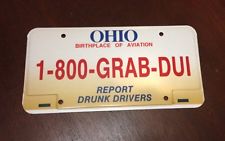 We are all urged to call the police if we suspect someone is driving under the influence. This message comes to us in radio and television commercials, on billboards, and on cruiser license plates: 1-800-GRAB-DUI. If someone makes the call, when should the police be permitted to stop the driver based on that informant’s tip alone? This question is a hot topic in Ohio DUI/OVI law this year. Two Ohio appellate courts decided ‘informant tip’ cases last month, and the United States Supreme Court decided one earlier this year.
We are all urged to call the police if we suspect someone is driving under the influence. This message comes to us in radio and television commercials, on billboards, and on cruiser license plates: 1-800-GRAB-DUI. If someone makes the call, when should the police be permitted to stop the driver based on that informant’s tip alone? This question is a hot topic in Ohio DUI/OVI law this year. Two Ohio appellate courts decided ‘informant tip’ cases last month, and the United States Supreme Court decided one earlier this year.
The two recent Ohio cases of State v. Whem and State v. Whitacker have many similarities. In both cases, an informant called the police to report a suspected drunk driver. In both cases, the police stopped the suspected drunk driver without observing any additional evidence the driver was under the influence. In both cases, the defendant filed a motion to suppress evidence and argued the informant tip did not justify the traffic stop. In both cases, the trial judge overruled the defendant’s motion to suppress. In both cases, the defendant appealed to the Court of Appeals.
Whem and Whitacker have different outcomes. In Whem, the Court of Appeals agreed with the trial court the initial stop of the defendant was justified. In Whitacker, the Court of Appeals disagreed with the trial court, concluding the stop of the defendant was illegal.
The different outcomes in Whem and Whitacker are based primarily on the information provided by the informant. In the Whem case, the informant was a hotel employee who gave his name, described in detail what he observed, and gave the license plate of the vehicle driven by the suspected drunk. In Whitacker, the informant was anonymous and simply reported there were intoxicated females with children in a red vehicle behind a bar. The Court focused on the fact the informant did not provide his or her name. The Court stated, “When the stop is based solely on the information from an anonymous informant, it is generally insufficient to form the basis of an officer’s reasonable suspicion of criminal activity”.
The case decided earlier this year by the United States Supreme Court is Navarette v. California. In that case, an anonymous caller reported she was driving on Highway 1 and was run off the road by a silver Ford F-150 with a California license plate. Police stopped the truck and found drugs in it. The driver and passenger were prosecuted for drug possession. In upholding the stop, the Supreme Court observed, “under appropriate circumstances, an anonymous tip can demonstrate sufficient indicia of reliability to provide reasonable suspicion to make an investigatory stop.”
The Court concluded this anonymous tip was sufficiently reliable because: the caller personally observed the criminal activity; the caller gave the license plate number; the caller used 911 and could be prosecuted for misusing it; and the 911 operator verified the truck’s location. I am no Supreme Court Justice, but I do not agree these factors made the anonymous tip sufficiently reliable to justify detaining the truck and its occupants.
Some may not be bothered by the ruling in Navarette because the stop ultimately resulted in the convictions of two people who were breaking the law by possessing drugs. The problem with the ruling is its impact on all of the drivers who are not breaking the law. Based on this ruling, any of us can be pulled over because someone angry with us claims we committed a traffic offense, so long as the angry caller uses 911 and provides the correct location of the vehicle. When the United States gets to the point where police can detain us for no reason, people will wonder how our Constitutional protections were taken. We will then look back at decisions like Navarette and realize they were taken one case at a time.
 Columbus OVI/DUI Attorney Blog
Columbus OVI/DUI Attorney Blog

